El brasileño Cival Einstein es nuestro invitado de hoy en este Vis a vis. Es caricaturista e ilustrador. Publica sus obras desde 1999, en revistas en Brasil (varias), Serbia, Letonia, Bosnia y Herzegovina, Turquía.
Muestra sus caricaturas en innumerables exposiciones en Brasil (muchas), Rumanía, Italia, Colombia, entre otros países.
Ha obtenido premios y distinciones con concursos internacionales en Brasil (varios), Macedonia (varios), Colombia (varios), Rumanía (varios), Armenia (varios), Siria (varios), Noruega, Egipto, Turquía (varios), China, Chipre, Kurdistán, Marruecos, Serbia, y Argentina.
Como jurado, ha sido invitado a concursos internacionales en Israel, Turquía, Macedonia, Siria, Colombia, Kosovo, Rumanía y Kurdistán.
Actualmente ilustra libros y realiza caricaturas en vivo en eventos.
Sin dudas es un honor compartir este espacio con él.
PP: Querido Eisntein, para los seguidores de Humor Sapiens, ¿podrías presentarte? (porque creo que mi presentación fue muy fría, solo con datos y quzás hasta incompleta). ¿Cómo te gustaría ser conocido o recordado?
EINSTEIN: Un ciudadano que nació en el noreste brasileño, que lucha por la paz mundial, expresándose a través del humor y el arte, este es Cival Einstein... humano, no soy un robot.
PP: Dime qué lees aquí “ L5rw8KP” para comprar si no lo eres, ja, ja. Y ahora en serio, ¿en qué momento decidiste dedicarte al humor?
EINSTEIN: No defino un momento, pero nació espontáneamente, estuvo y sigue dentro de mí; pero hablando en términos de tiempo, desde 1999, profesionalmente.
PP: Eres joven, así que empezaste muy temprano. Dime, ¿cuándo comenzaste a dibujar en esos primeros años, ¿lo hiciste sin un estilo específico? Y si tenías uno, ¿cuál sería? ¿Fuiste influenciado por caricaturistas nacionales o extranjeros en ese momento?
EINSTEIN: He tenido varias influencias, pero nunca me gustó copiar mis influencias. Mencionando algunos caricaturistas aquí: Leonte Nastase (Rumania), Julian Pena Pai (Rumania), Ziraldo (Brasil), Milan Alasevic (Eslovenia), Fernando Pica (Colombia), Agim Krasniqui (Kosovo) y muchos otros. Me da miedo ser injusto con los nombres, pero hubo muchas más influencias. Simplemente nunca me gustó copiarlos. Siempre he intentado expresar mi estilo de la mejor y más natural manera.
PP: Bueno, las influencias son inconscientes, no es que uno se proponga plagiar a alguien. Pero, ¿cómo ha evolucionado tu trabajo a lo largo del tiempo en términos de forma y contenido?
EINSTEIN: A través de más lectura, observación... Lo que también ha contribuido a resaltar ideas y pensamientos en el área del humor fue la actividad física, específicamente el ciclismo. Esto se ha sumado al potencial artístico.
PP: Sin dudas, te fuiste superando, cultivando, y fuiste ganando en calidad artística, pero me refería más a la evolución de forma-contenido, que es más sobre intereses artísticos que van evolucionando. Oye y buenísimo eso que practiques ciclismo. Lo más cerca que he estado del ciclismo en verlo en las Olimpiadas, Así que te envidio. Pero sigamos con tu obra, ¿cuál método prefieres: dibujar caricaturas humorísticas sin palabras o con texto? ¿Por qué?
EINSTEIN: Sin texto, porque el dibujo crea su propia autonomía de comunicación y reacción humorística. En algunos casos, es necesario incluir texto porque el humor es regional, y por esta razón no se entenderá universalmente.
PP: De acuerdo contigo. Amigo mio, entre los muchos premios que has recibido, ¿cuál te conmovió o impactó más?
EINSTEIN: Creo que todos, simplemente porque es difícil ganar un premio, causan una emoción diferente de desafío, precisamente porque es difícil.
PP: Es cierto lo que dices, pero creo que fuiste algo. Diplomático, para no sentir. Que escoges uno y discriminas a otros. Te cuento que hago esa preguntas, porque algunos colegas a provechan para contarme por qué sintieron un premio más que los otros y confiesan o que fue el primero, o que lo ansiaban mucho, o que en esos momentos estaba depremido y el premio lo estimulo, etc., etc. peeo continuamos, cuéntame qué tipo de humor te gusta crear más. Aquí tienes algunas opciones:
a) El que simplemente te hace reír.
b) El que te hace reír y pensar.
c) El que te hace pensar, aunque sea solo crítico o satírico.
d) El tipo burlón, irrespetuoso u ofensivo.
¿Y por qué no elegiste los otros? (Si es que dejaste alguno fuera, claro).
EINSTEIN: Opción (b), el humor que te hace reír y pensar provoca una reacción plural en el campo visual y cerebral de la persona, con efecto inmediato, es como un golpe al cerebro y la persona abre los ojos. Esto es positivo, además de filosófico.
PP: De acuerdo contigo, pero en mi caso me gusta también hacer reír a las personas y claro, si además logras que piense, mejor. Y me alegro que no hayas escogido el “d”, no lo soporto. Bueno, una pregunta obligada: ¿cuáles son los límites del humor, si es que existen?
EINSTEIN: Creo que eso no es humor, sino más bien libertinaje ofensivo.
Por ejemplo, chistes racistas, chistes sobre personas autistas, chistes sobre personas con discapacidad... no hay aprecio por este tipo de “humor” que para mí no es humor.
PP: Es correcto lo que dices. Eso depende de la ética de cada humorista. Pero puedes hacer un chiste sobre algo que hizo mal una autoridad y te ponen límites, o a veces un medio por sus intereses económicos te ponen límites, e incluso haces chistes que tu interés no es ni burlarte de autistas, discapacitados, etc. y te ponen límites, porque los límites lo ponen también gente mala o ignorante, no solo lo ponen gente buena, inteligente y sensible. ¿Alguna vez has sido censurado? ¿Te censuras a ti mismo con frecuencia, rara vez o nunca?
EINSTEIN: Sí, he sido censurado, con humor inteligente y filosófico. Me han llamado antisemita, en fin, la historia es larga. Sí, considero el humor porque soy una persona espontánea, por esta razón es necesario pensar.
PP: Bueno, si no te sientes antisemita, porque eso es algo terriblemente negativo, alguien entendió que lo fuiste y ahí tienes un ejemplo de que te pusieron límites. Son límites, externos, querido Einstein, que no dependen de nosotros. Conozco colegas que han hecho chistes sobre homosexuales y lejos de ser humillantes, ofensivos para esa minoría y se lo han censurado, porque en los censuradores hay de todo, como te decía. Pero miremos más holísticamente nuestro universo del humor. ¿Cómo lo ves en el presente y en el futuro?
EINSTEIN: Complejo. Desafortunadamente, algunos salones de humor desconocen la inteligencia artificial, que no es inteligente en absoluto, sino más bien un ladrón de ideas, y están premiando a personas que usan este tipo de herramienta, y son recompensadas injustamente por algunos salones (no todos). Este es el desafío del futuro que los salones de humor tendrán que enfrentar...
PP: Deberían crear concursos solo para obras creadas por IA, ¿no es cierto? Y si alguien convoca un concurso y no desea que participen obras creadas por IA, que lo diga en las bases del concurso. Claro, puede llegar el momento en que sea imposible detectar una obras artesanales de una creada por la máquina y ahí es donde debemos ponernos de acuerdo todos. A mí me gusta la IA, pero para usarla como una herramienta, no para sustituir la creación individual de un humorista. Creo que faltan muchas cosas por definir en ese campo todavía. Sin embargo, me preocupa más que no logremos que Internet pague el derecho de autor por nuestras obras. Es que cada día cierran más espacios en los medios y necesitamos Internet. Oye, pero nos hemos puesto muy graves. Para amenizar un poco, ¿podrías compartir una anécdota divertida, curiosa o inteligente que hayas vivido durante tu carrera en la comedia?
EINSTEIN: “Un tiro en el pie”, espero que tú, yo y muchos otros estemos dormidos y a quien le disparen sea al calcetín y al zapato jajaja.
PP: O al tener el pie enyesado, o estar con una pata de palo. Pero mejor es no usar armas, ¿verdad? Bueno, para ir cerrando, ¿hay alguna pregunta que no te hice que te gustaría que te hiciera? Si es así, ¿podrías responderla ahora?
EINSTEIN: No hay ninguna...
PP: Perfecto. Y algo que siempre pregunto: ¿qué consejo me darías, como humorista?
EINSTEIN: Pregunta difícil, jajaja. No tengo consejos, el humor es un estado de ánimo del grado más elevado del alma.
PP: Muy bien, y ahora sí, para finalizar ¿te gustaría dedicarles unas palabras a los lectores de Humor Sapiens?
EINSTEIN: El sitio web Humor Sapiens es genuinamente Humor, Humor original.
Disfruten del humor, queridos lectores, mientras tengamos libertad de expresión y personas como Pepe Pelayo y caricaturistas con la vena creativa aún hagan reír y reflexionar al mundo en tiempos extraños. ¡Larga vida al Humor, VIVA...!
PP: Gracias por tus generosas palabras, amigo mío. Te agradezco muchísimo que hayas tenido tiempo y atención para realizar este Vis a vis.
Te deseo mucha salud y muchos éxitos más!!
Un abrazo.
(Este texto ha sido traducido al español por ChatGPT)
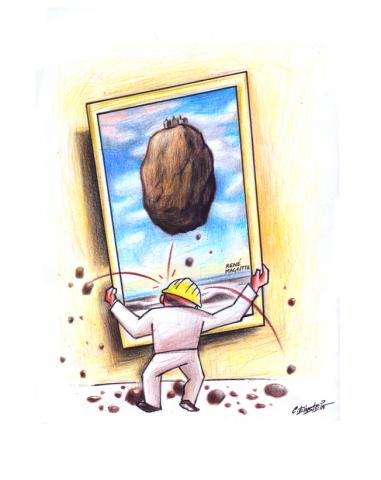
Art safety
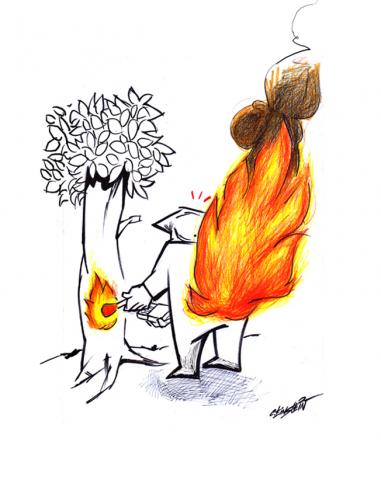
Nature reaction
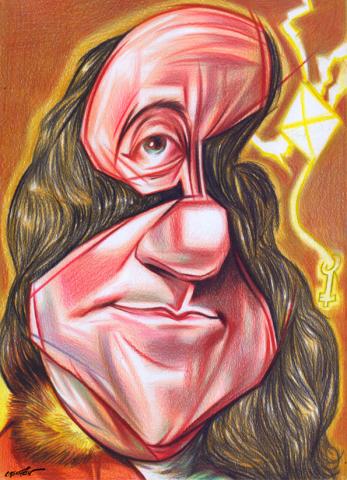
Benjamin Franklin
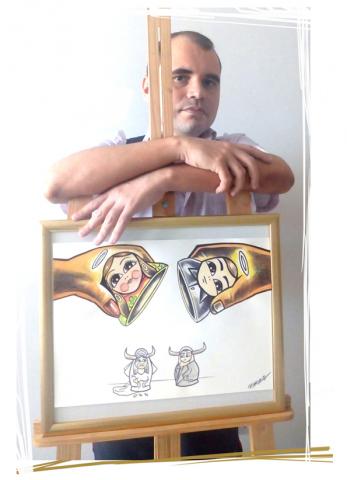
Cival Einstein
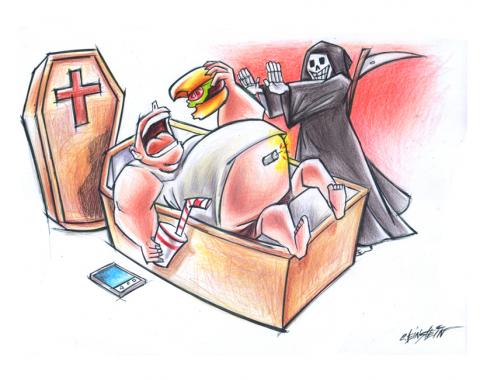
Charge
Interview with Cival Einstein
by Pepe Pelayo
Brazilian artist Cival Einstein is our guest today in this Vis-à-vis.
He is a cartoonist and illustrator. He has been publishing his works since 1999 in magazines in Brazil (several), Serbia, Latvia, Bosnia and Herzegovina, and Turkey.
He has exhibited his cartoons in countless shows in Brazil (many), Romania, Italy, Colombia, and other countries.
He has received awards and honors in international competitions in Brazil (several), Macedonia (several), Colombia (several), Romania (several), Armenia (several), Syria (several), Norway, Egypt, Turkey (several), China, Cyprus, Kurdistan, Morocco, Serbia, Argentina, and others.
As a juror, he has been invited to international competitions in Israel, Turkey, Macedonia, Syria, Colombia, Kosovo, Romania, and Kurdistan.
He currently illustrates books and does live caricatures at events.
It is certainly an honor to share this space with him.
PP: Dear Einstein, for the followers of Humor Sapiens, could you introduce yourself? (Because I think my intro was too cold, just factual, and perhaps even incomplete). How would you like to be known or remembered?
EINSTEIN: A citizen born in northeastern Brazil, who fights for world peace, expressing himself through humor and art—this is Cival Einstein… human, I’m not a robot.
PP: Tell me what you read here: “L5rw8KP” to check if you're really not one, ha ha. But seriously now, at what point did you decide to dedicate yourself to humor?
EINSTEIN: I can’t pinpoint a specific moment, but it happened spontaneously—it was and still is within me. Speaking in terms of time, I’ve been doing it professionally since 1999.
PP: You’re young, so you started quite early. Tell me, when you began drawing in those early years, did you do so without a specific style? And if you had one, what was it? Were you influenced by national or foreign cartoonists at the time?
EINSTEIN: I’ve had many influences, but I never liked copying them. To name a few: Leonte Nastase (Romania), Julian Pena Pai (Romania), Ziraldo (Brazil), Milan Alasevic (Slovenia), Agim Krasniqi (Kosovo), and many others. I’m afraid of being unfair with names, but there were many more. I just never liked imitating them. I always tried to express my own style in the most natural way possible.
PP: Well, influences are unconscious; it's not like we intend to plagiarize someone. But how has your work evolved over time in terms of form and content?
EINSTEIN: Through more reading, observation… What also helped bring out ideas and thoughts in the humor field was physical activity—specifically, cycling. That added to my artistic potential.
PP: Without a doubt, you’ve improved, cultivated your craft, and gained artistic quality. But I meant more the evolution of form-content, the artistic interests that develop over time. And by the way, it’s great that you practice cycling. The closest I’ve been to cycling is watching it in the Olympics. So I envy you. But back to your work—what method do you prefer: drawing humorous cartoons without words or with text? Why?
EINSTEIN: Without text, because the drawing creates its own autonomous form of communication and humorous reaction. In some cases, text is necessary because the humor is regional and would not be understood universally.
PP: I agree with you. My friend, among the many awards you’ve received, which one moved or impacted you the most?
EINSTEIN: I think all of them. Simply because it’s hard to win an award, they all bring a different kind of excitement and challenge—precisely because it’s so hard.
PP: That’s true, but I think you were being diplomatic to avoid choosing one and making others feel less. I ask that question because some colleagues take the opportunity to tell me why a certain award touched them more—maybe it was their first, or they really longed for it, or they were going through a tough time and it lifted their spirits, etc. But let’s continue. Tell me what kind of humor you like to create the most. Here are some options:
a) The kind that simply makes you laugh.
b) The kind that makes you laugh and think.
c) The kind that makes you think, even if it’s just critical or satirical.
d) The mocking, disrespectful, or offensive type.
And why didn’t you choose the others? (If you left any out, of course.)
EINSTEIN: Option (b). The humor that makes you laugh and think provokes a plural reaction in the visual and cerebral field of the person, with immediate effect—it’s like a blow to the brain, and the person opens their eyes. It’s positive, and also philosophical.
PP: I agree with you, but in my case I also enjoy making people laugh—and of course, if you can get them to think too, all the better. And I’m glad you didn’t choose option “d,” I can’t stand that kind of humor. Now a must-ask question: what are the limits of humor, if there are any?
EINSTEIN: I believe that’s not humor, but rather offensive licentiousness.
For example, racist jokes, jokes about autistic people, jokes about people with disabilities… I don’t appreciate that type of “humor” because, to me, it’s not humor.
PP: You're absolutely right, but sometimes you make a joke criticizing a public figure and you get censored, or a media outlet censors you because of their financial interests. Sometimes people think you’re mocking autistic or disabled individuals when that wasn’t your intention at all. Limits are also set by bad or ignorant people, not just good, intelligent, and sensitive ones.
Have you ever been censored? Do you often self-censor, rarely, or never?
EINSTEIN: Yes, I’ve been censored—with intelligent, philosophical humor. I was called antisemitic… it's a long story. Yes, I do consider humor carefully because I’m a spontaneous person, and for that reason, I need to think.
PP: Well, if you don’t see yourself as antisemitic (which is a very negative thing), then someone misunderstood you—and there’s an example of external limits we don’t control. I know colleagues who’ve made jokes about homosexuals that were far from offensive or humiliating, and they were still censored. Because among the censors, there’s all kinds of people, as I said. But let’s look more holistically at our world of humor. How do you see it now and in the future?
EINSTEIN: It’s complex. Unfortunately, some humor salons are unaware of artificial intelligence—which is not intelligent at all, but rather a thief of ideas—and are awarding prizes to people using such tools. Some salons (not all) reward them unfairly. This is the challenge humor salons will have to face in the future…
PP: Maybe we should create competitions for AI-created works, right? And if someone wants to organize a competition and exclude AI-created works, they should say so in the rules. Of course, the time may come when it’s impossible to distinguish between a handmade and an AI-generated piece. That’s when we’ll all need to reach a consensus. I like AI, but only as a tool—not to replace the individual creation of a humorist. I think there’s still a lot to define in that field.
However, what worries me more is that we won’t be able to get the Internet to pay copyright for our works. More and more media spaces are closing, and we need the Internet.
But hey, this has gotten serious. To lighten things up—could you share a funny, curious, or clever anecdote from your comedy career?
EINSTEIN: “A shot in the foot.” I hope that you, I, and many others are asleep and the one getting shot is the sock and the shoe, hahaha.
PP: Or that the foot is in a cast… or it’s a wooden leg. But better to not use guns, right? Well, to wrap up: is there a question I didn’t ask that you wish I had? If so, could you answer it now?
EINSTEIN: There isn’t one…
PP: Perfect. And something I always ask: what advice would you give me, as a humorist?
EINSTEIN: Tough question, hahaha. I have no advice—humor is a state of mind at the highest level of the soul.
PP: Very well. And now, to truly finish, would you like to dedicate a few words to the Humor Sapiens readers?
EINSTEIN: The Humor Sapiens website is genuine Humor—original Humor.
Enjoy humor, dear readers, while we still have freedom of expression and people like Pepe Pelayo and cartoonists with a creative vein still make the world laugh and reflect in strange times. Long live Humor, VIVA…!
PP: Thank you for your generous words, my friend. I’m truly grateful you took the time and attention to do this Vis-à-vis.
I wish you lots of health and continued success!!
A big hug.

